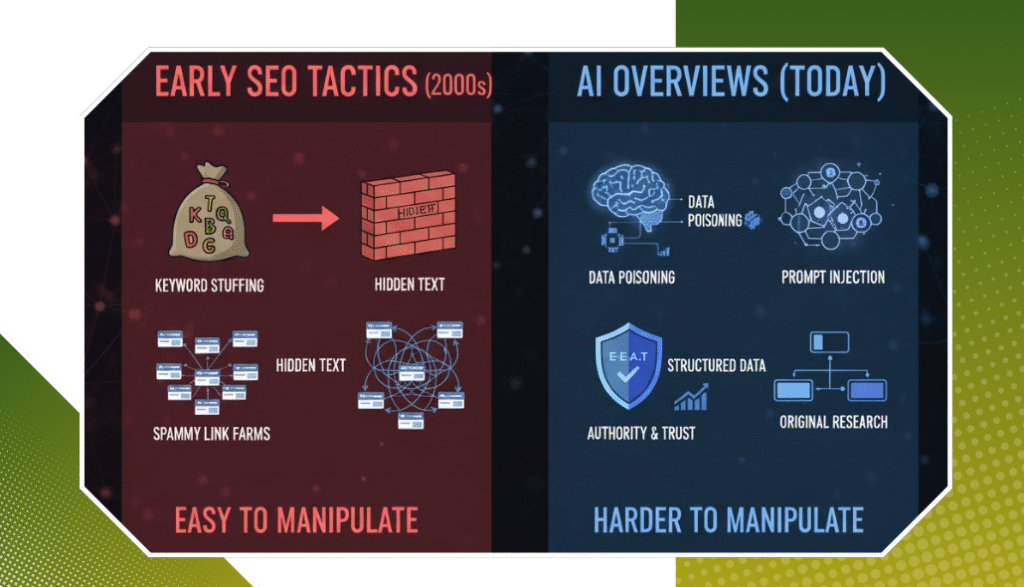But when AI knows so much about you, it makes you wonder: Are there secret worries about your privacy? When these smart answers are made just for you, is your personal info safe? This is a really important question. Let’s talk about how these perfect answers are made and if they cause any privacy problems.
How These “Just for You” AI Answers Work
Personalised AI Overviews are simple. The more AI knows about you, the better it can guess what you want. It’s like a super smart friend who remembers everything you’ve ever done online.
Here’s how it works:
- They Collect Info: These AI programs collect lots and lots of info about you.
- What are you searching for?
- What websites do you visit?
- What you buy.
- Where are you right now?
- What kind of phone or computer do you use?
- Even what you “like” on social media.
- They Learn from This Info: All this info is put into giant computer brains (AI programs). These brains find patterns. They learn what people like you usually want. They might even put you in a group with others who like similar things.
- They Give You Perfect Answers: Once the AI understands your habits, it gives you personalised answers. It tries to guess what you’ll want next. Like, if you often search for hiking boots, the AI might show you specific brands of boots in its answer when you search “best shoes.”
It’s all about using your past online steps to make a special experience just for you.
The Big Privacy Worries with Personal AI Answers
Personalised AI sounds helpful. But it has some big privacy worries. Because AI needs so much info about you, here are some problems:
- Too Much Info Collected: AI collects a huge amount of info. This can be very private stuff. Like, what you search for about health or money. Sometimes, this happens without you even knowing.
- Secret Info Risk: Some info collected is very personal. What if it gets out? Like your health searches or money habits.
- Using Info for Other Reasons: What if info collected for one reason (like better search) is used for a different reason? A reason you never agreed to.
- AI Can “Guess” About You: Even if your name isn’t on the data, AI is super smart. It can put small bits of info together. Then, it might guess personal things about you, like your religion or health problems. It might be guessed from your online actions.
- Connecting Info: Companies might mix info they have about you with info from other places. This builds a much fuller picture of you. That can be scary.
- AI Can Be Biased: AI programs learn from the information given to them. If that info has old biases (like treating some groups of people unfairly), the AI can learn those biases too. This may produce AI responses which are biased or else they may present only a single perspective.
Real examples of problems:
- A fitness app once accidentally showed secret army base locations. It happened because it shared user data by default.
- Companies have been sued for using face pictures from social media. They used them without asking for permission.
- Sometimes, AI tools for hiring people have shown unfair treatment to certain groups.
- People have put secret work info into AI chatbots. Then, that secret info got out.
These stories show that even if people mean well, collecting lots of data for AI can lead to big privacy problems.
How to Make Personal AI Answers Safer
Keeping your privacy safe with personalised AI Overviews is a huge job. But there are important steps being taken:
- Be Clear (Transparency): Companies need to tell you clearly what info they collect. And why. And how they use it for AI answers. This means privacy rules should be easy to read. Not just long legal papers.
- You Control Your Info (Stronger Permission): You shouldn’t just click “I agree” once. You should be able to choose what info is used. And how. You should have clear choices about your data.
- Keep It Locked Up (Tight Security): Like a strong lock on your door, companies need strong digital locks on their info. This means using special ways to scramble data. So only the right people can see it. And they need to check for hackers often.
- Privacy from the Start (“Privacy by Design”): Privacy should be built into AI programs from the very beginning. Not added later. This includes:
- Collect Less Info: Only collect the info that is truly needed.
- Hide Who You Are: Change info so it can’t point back to you. Like using a random code instead of your name.
- Learn on Your Device: Instead of sending all your info to one big computer, the AI can learn directly on your phone. Then, it only sends general patterns back. Your private info stays on your device.
- Fair Rules for Data (Ethical Data Governance): Companies need clear rules. And people are in charge to making sure AI is used fairly. This means checking AI for biases. And making sure decisions are responsible.
Many countries have new rules for protecting your data, like in Europe, California, and India. These new rules make companies be more careful with your info, especially with AI.
The Future: Smart Answers and Safe Privacy
Personalised AI Overviews are still new and growing fast. They help us get smart, tailor-made info. But they also bring ongoing privacy problems. As computers get smarter, our laws and how we think about privacy must also get smarter, quickly.
We need more work from:
- Scientists: To find new ways to keep AI private.
- Lawmakers: To make clear, strong rules for your info.
- Companies: To act in a good way and put your privacy first.
- You (the user): To be aware and ask for control over your info.
The aim is to achieve a balance. To bring in super-smart AI responses. At the same time, we must also make sure our personal data is protected and that we keep our privacy rights strong. It is a long-term issue which we all play a role in.
Conclusion
So, do custom AI reports have privacy issues? Yes, they do. These smart AI responses require a lot of your information. This means we must worry about how that info is used. And who sees it? And what guesses the AI can make about you.
But knowing these risks is step one. By asking for clear rules, more control for you, strong security, and fair use, we can work towards a future. A future where smart AI answers are helpful. But they don’t take away your privacy. It’s about building AI that you can trust.
Understanding these privacy worries is very important for everyone. If you’re confused about online privacy and need help making your online presence safe and good, contact us at Rankingeek Marketing Agency today for SEO services. We can help you make sure your website is seen. And your privacy is safe in this new AI world!




